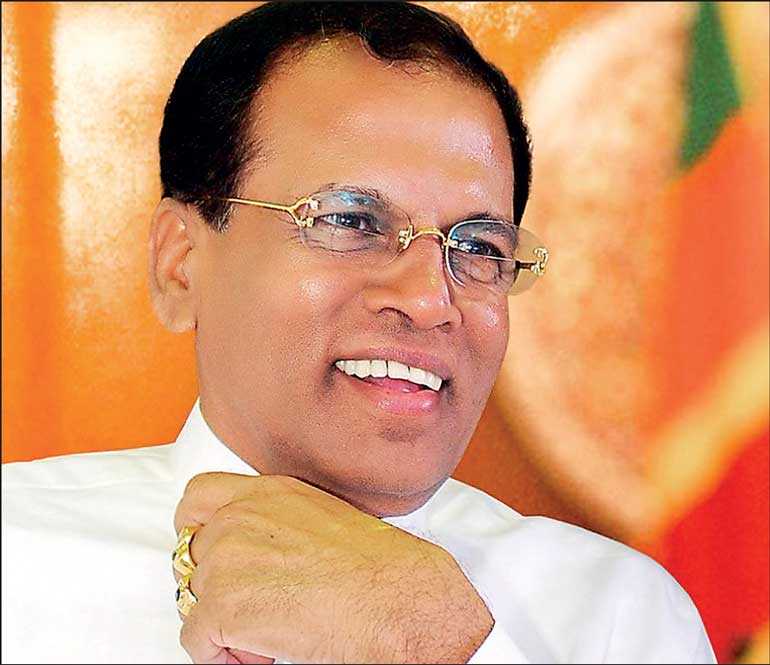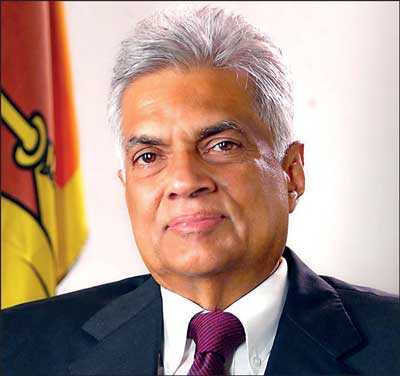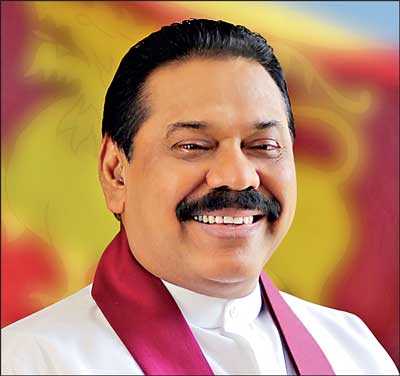Monday Feb 16, 2026
Monday Feb 16, 2026
Friday, 14 December 2018 00:00 - - {{hitsCtrl.values.hits}}

The crisis that has been developing in Sri Lanka, manifesting itself in varied forms at different times since independence, has now taken the form of a constitutional crisis, threatening the survival of the Sri Lankan State. Regardless of the Court’s decision, the collapse of the State cannot be avoided. The arbitrary act of the President has only accelerated the momentum of this collapse, plunging the State into a complete anarchic situation. One thing I can say for sure is that restoring the Government to the status quo of 26 October or opting for a presidential or parliamentary election will not prevent the great collapse that has gripped the State.
 |
Ranil Wickremesinghe |
 |
Mahinda Rajapaksa |
The President’s stance is that Ranil Wickremesinghe shall not be given the appointment of the next prime minister, even if a decision is made to reinstate the previous government. By doing so, the President hopes not only to take revenge on Ranil Wickremesinghe but to create a terrible crisis in the UNP, impair its strength and gain control over it so that he could stay ahead of its influence.
At this moment, regardless of who would be selected as the next prime minister except Ranil Wickremesinghe, given the power structure of the UNP, a serious internal crisis in the party is inevitable. The UNP's power structure rests on a system which gives paramount importance to its leader’s close confidantes. As such, a change in the party leadership at this moment will inevitably lead to a major transformation in the power structure of the party, creating a great crisis within the party. It is also seen as the strategic political ambition of the President.
The internal democracy of political parties
As we have already discussed, one important observation by the Donoughmore Commission was that the political parties that prevailed in Sri Lanka at that time could not be considered democratic. Although nearly 80 years have lapsed since the Donoughmore Commission, in a democratic sense, there was no positive development in the political parties of the country. Even at present, Sri Lankan political parties cannot be reckoned to be democratic. They do not have a democratic structure. Most of them are based on structures designed to give more weight to a dictatorial system with tight central controls.
There is hardly a single political party in the country which can be called democratic internally or in their organisational practices. The organisational structures of all political parties have been modelled in a way that gives the party leader despotic power. The party members have no right to actively participate in the decision-making process. There is no transparency in party funding. All political parties are maintained not on membership funds, but on black money. 
The Constitutions of political parties cannot be considered democratic. They are more dictatorial than democratic. In the final analysis, all political parties can be considered entities that promote the party leaders as dictators and restrict the party members to playing a mediocre role as henchmen to their dictatorial leaders.
The dictatorship-style party system has also been a significant factor in the degeneration of the State. There is no system to assess the internal democracy and the true objectives of political parties.
Even the Election Commission that was set up recently with much fanfare and display can be considered a backward element compared to the Indian Election Commission. Those who formulated the Election Commission have not studied the Election Commission of India. There are strict rules governing political party funds, election funds and election expenses in India. The Indian Election Commission has the power to investigate the funds of political parties and how they are being used for elections. Besides, it has powers to investigate the internal democracy of political parties and to proscribe political parties that do not practice democratic principles internally. The Election Commission of Sri Lanka has not been empowered to investigate internal party democracy and party funds. It does not even seem to be interested in obtaining such powers.
Predatory nature
Almost all political parties in the country, big or small, are engaged in a battle to seize political power and become direct or indirect partners of that power, considering it an opportunity given to them to exploit public property at their whims and fancies. While the UNP and the SLFP, the two major political parties, are asserting their right to plunder public property, the other small parties representing Parliament tend to adopt a policy that directly or indirectly supports the ruling party to become the partners in this process and enjoy the benefits of the exploitation of public property. 
It was the UNP that introduced the corrupt practice of allowing Sri Lankan Parliamentarians to conduct business with the government and to act as contractors, licence holders and purchasers of the property, a practice rarely found in any other democratic country. The irony of this situation is that even the SLFP, the major opposition, and the other political parties did not oppose it. They too willingly adhered to this corrupt tradition.
It should also be emphasised that there is no other country in the world except Sri Lanka where MPs are provided with vehicles and vehicle permits and fuel for those vehicles free of charge. Even quasi-revolutionary parties like the JVP and the JHU did not oppose this corrupt system. Instead they too adapted to this predatory system. If they had opposed this corrupt practice instead of becoming a party to it, it would certainly have created a major crisis.
The subject of radio waves and frequencies in Sri Lanka can be considered a sphere of acute exploitation. Radio waves are commonly acknowledged as a "rare treasure” by the world as a whole. Usually, frequencies are sold by auction in any state in the world. They fetch a very high price. The license-holder has the right to run a radio or television broadcasting station. However, in view of the fact that the radio frequencies are treated as public property, the owner is bound to follow a policy beneficial to the public and contributes to public good. However, radio frequencies of Sri Lanka are sold secretly, not in the public domain. The Treasury only gets a nominal price, not the real price of it. The proper price that ought to have gone to the Treasury ends up in the pocket of a third party.
The other important point is that the owners of broadcasting centres do not follow a policy frame beneficial to promoting public taste and discernment in pursuing their business. Rather, it leads more to undermining artistic taste and the fair judgement of the audience. This unpleasant role of the media too can be considered a powerful reason of the deterioration of the State and keeping the public consciousness at a level which is poor and uncritical.
During the reign of President Chandrika Kumaratunga, a number of television and radio licences were given to a trustworthy crony of her. It was those licences that one of the leading media institutions had purchased from that person later. The Chairman of the Telecommunications Regulatory Commission, also appointed by Chandrika Kumaratunga, carried a licence in his pocket when he left the Commission on the eve of her government’s change. It was sold to another leading television company allegedly for $ 5 million.This gives a rough idea of the market price of radio waves and frequencies. Even though the price ought to have gone to the Treasury, it went into the pocket of the former chairman.
During the rule of Mahinda Rajapaksa’s regime, some of those who contributed to his victory in 2005 were compensated with permits to set up of radio broadcasting stations. These licenses were issued to the JHU, JVP and a well-known Buddhist monk who sold it to an owner of a tea company for Rs. 40 million. This creates an idea of the price of the licences Rajapaksa issued to two small political parties and a Buddhist monk who supported him, from state property.
The Rs. 120 million fetched through the sale of three licences ought to have gone to the Treasury. But this huge sum of money too ended in the pockets of the two political parties and the Buddhist monk. This example illustrates the way in which the smaller parties with a revolutionary façade too contribute to the plunder of state property that takes place in the country’s political arena. Obviously, they were intelligent enough to realise that it was a bribe given to them from public property. We must not forget that even the current President has been accused of having issued licences for radio waves and frequencies to a broadcasting company that supports him, to expand its capacity to a level which is even much bigger than the capacity of the state transmission stations.
The dawn of renaissance
The current constitutional crisis has pushed the state and its institutional system into a state of anarchy, causing a crippling breakdown of the entire system. Now Sri Lanka has no formal Constitution except a deformed and disorderly Constitution.
This could also completely destroy the country’s entire old political system. Simultaneously, it may lead to the end of the recognition of old political parties and their leaders. The people will be subjected to untold hardships. Though it may sound paradoxical, perhaps, this situation might result in the shedding of obsolete and archaic attitudes and the creation of a more modern and rational society.
The political embryonic seed of the renaissance movement had occurred and developed in the ideological womb that was able to foresee the impending anarchic situation in advance and was determined that this situation must be made an opportunity to re-create the state which ensures rule of law and is free of corruption and inefficiency. Just as much as it foresaw the deterioration of the State, it was able to see the constitutional crisis in advance. From its inception, its main goal was to recreate the nation, overcoming all discriminations based on ethnic, caste and religious differences and ensuring equal rights and respect for all citizens and in this process to promote social integration as a lead-up to the recreation of the State which was in a deplorable state of depletion and collapse.
The renaissance movement was also of the view that considering the extent of deterioration, even if the ruling power is seized through a general election, the winner will invariably become an unfortunate victim of the putrid system, thereby being unable to effect any far-reaching changes. It also held that it must stay out of Parliament, refrain from contesting elections and instead mobilise people to exercise their democratic rights directly and peacefully to achieve the anticipated changes. The renaissance movement also believed that the collapse of the State would be a historic moment as it offers the necessary space for the public to make a direct democratic intervention. The renaissance movement warned the public well in advance about the devastating constitutional crisis that was to come in the guise of a political tsunami before the next presidential election. People were informed of this development in writing or otherwise. It also produced a joint communiqué highlighting the issue which was signed by a select number of celebrated academics stressing the importance of public organisations working in collaboration to face the situation. The communiqué was circulated among public organisations.
As the renaissance movement believes the historic responsibility of changing the old State which is unjust, inefficient, corrupt and reached the verge of collapse and recreating a new State which is democratic, pluralistic, efficient, fair, free of corruption, law-abiding and in the perfect sense of the word is committed to safeguard the sovereignty of the people lies not on politicians but on the people of the country. The people of the country can only realise this goal if they are able to achieve the following basic condition: formation of a body of public organisations
Public organisations
Public organisations such as professional organisations, trade unions, farmers, fisheries and craftsmen associations, commercial and business organizations, arts, literature, culture and other non-governmental organisations should join together and form a mass organisation, a People’s Commissariat. The functions of this People’s Commissariat would be to:
The support of the media is a necessary condition for this initiative. So this body must look into the underlying causes of the deterioration in the media sphere and suggest reforms to be effected with the view of developing a media tradition responsible to the people.
Now the country has no Constitution. Drafting a new Constitution is a must and an essential requirement for the recreation of a new State. The three constitutions so far adopted had been drafted by disregarding the long-held policies, principles and traditions, dignity and solemnity to be maintained in Constitution-making. They can be considered constitutions adopted hurriedly, giving prominence to narrow political interests instead of the common good of the people and without the active participation of the people.
This body of public organisations should act as a guiding entity and develop a strategic program to avoid repetition of old errors and persuade the authorities to draft a new Constitution in line with the direct democratic rights and true participation of the people.